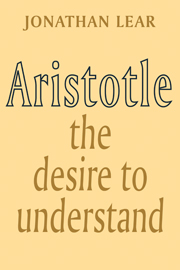1 - The desire to understand
Published online by Cambridge University Press: 04 August 2010
Summary
Aristotle's Metaphysics begins:
All men by nature desire to know. An indication of this is the delight we take in our senses; for even apart from their usefulness they are loved for themselves; and above all others the sense of sight. For not only with a view to action, but even when we are not going to do anything, we prefer sight to almost everything else. The reason is that this, most of all the senses, makes us know and brings to light many differences between things.
Aristotle is attributing to us a desire, a force, which urges us on toward knowledge. Of course, for some this desire does not exercise great influence; but for some of us it plays an important role in our lives. Aristotle no doubt believed it was this desire that motivated him to do the research and thinking that led to his writing the Metaphysics, and he trusted in this desire to lead others to study it. It is this desire that is responsible for your reading and my writing this book.
How did Aristotle know that we have this desire? One does not know the content of a desire unless one knows what ultimately satisfies it. By its satisfaction we learn what the desire is a desire for. That is why Aristotle speaks of the delight we take in our senses. If the knowledge we pursued were merely a means to a further end, say, power over others or control of the environment, then our innate desire would not be a desire for knowledge.
- Type
- Chapter
- Information
- AristotleThe Desire to Understand, pp. 1 - 14Publisher: Cambridge University PressPrint publication year: 1988
- 3
- Cited by



